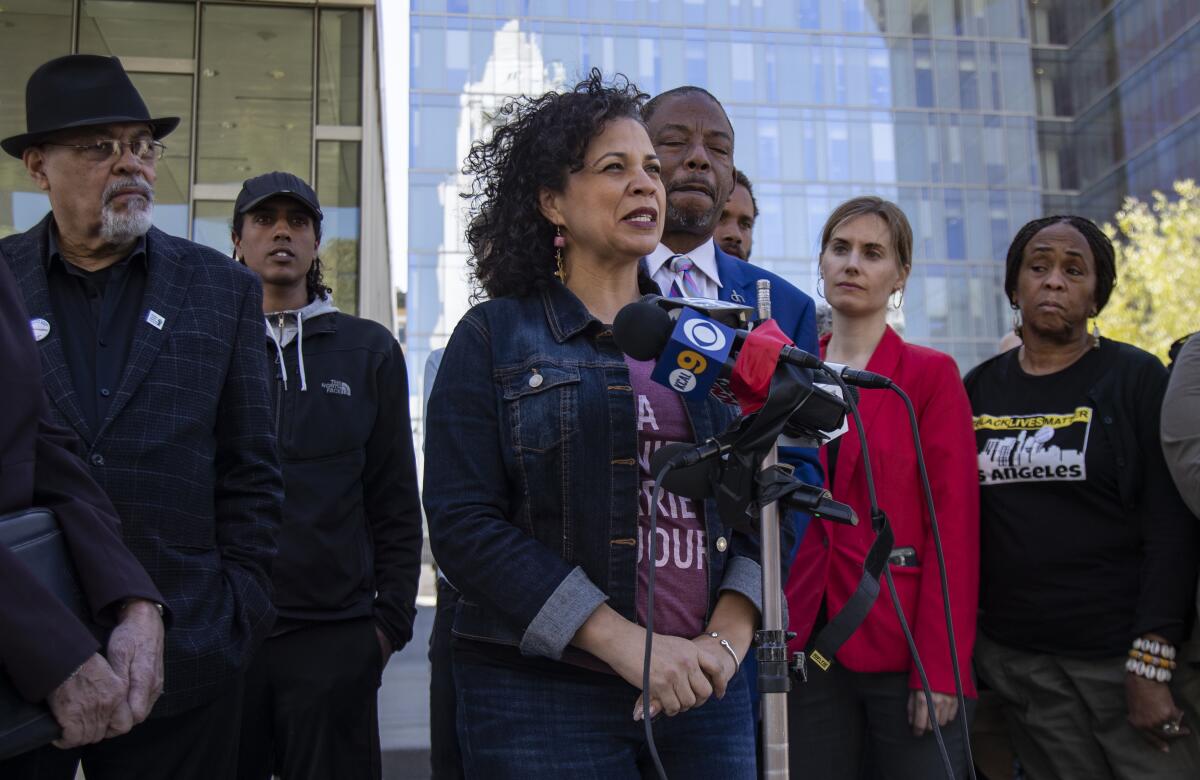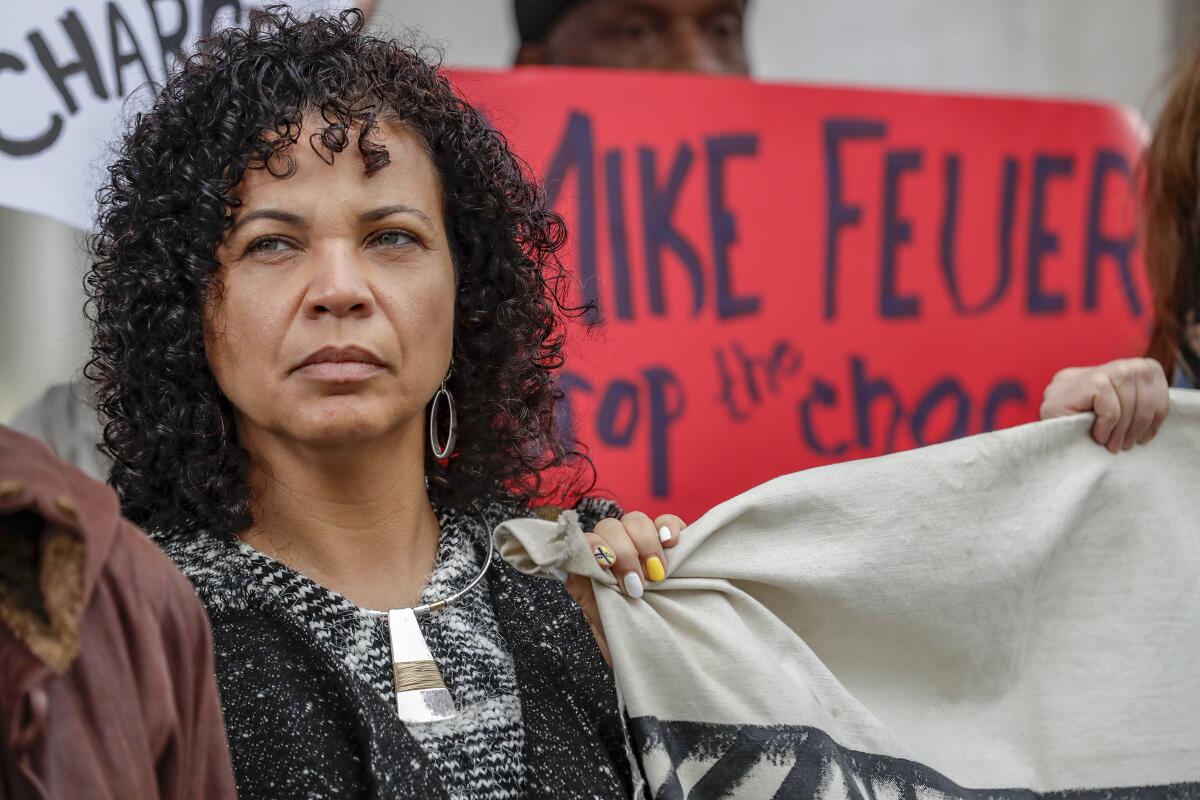Black Lives Matter activist Melina Abdullah’s 2018 arrest is upheld by federal jury

Melina Abdullah, co-founder of Black Lives Matter Los Angeles, was arrested with probable cause at a Los Angeles Police Commission meeting in 2018, a federal jury found Thursday after a two-day trial, siding with the city in her lawsuit alleging wrongful arrest.
Abdullah, a Cal State L.A. professor and fixture at Police Commission meetings, was arrested on suspicion of battery against a police officer after an officer said she grabbed his arm, but the charges were dropped by the Los Angeles city attorney’s office. She sued the city and former LAPD Chief Charlie Beck in 2020, about six months after the charges were dropped.
The jury deliberated for less than two hours before returning its verdict that Abdullah was not wrongfully arrested by then-LAPD Det. Jason Curtis.
“I’m in shock,” Abdullah said outside the courtroom Thursday. “Just like the shock I felt when I was arrested.”
In her lawsuit, Abdullah alleged she was singled out because she is a prominent Black activist. Her attorney, Carl Douglas, told the jury Abdullah attended hundreds of Police Commission meetings to criticize Los Angeles Police Department policies and the killing of unarmed civilians.
“Everyone knows Melina,” Douglas said of her role as an outspoken police critic.
Curtis, who is no longer a police officer, declined to comment on the jury’s verdict.
The incident at the May 8, 2018, Police Commission meeting began after another woman, Sheila Hines-Brim, threw a powdery substance at Beck; she said it was the ashes of her niece Wakiesha Wilson, who died in LAPD custody in 2016.
Abdullah watched as Hines-Brim was taken into custody at Beck’s command. Cellphone footage shown to the jury shows Abdullah follow Hines-Brim and a group of LAPD officers out of the meeting room.
Outside the meeting, an officer is heard calling out, “Detain Melina” and “Melina needs to be in custody.”
Footage shows an officer pull Abdullah’s arms behind her back and handcuff her. She said she thought she might have been detained for recording Hines-Brim’s arrest.
“I didn’t understand why I was being grabbed,” Abdullah testified Thursday.
Curtis said Abdullah grabbed him by the arm to stop him from taking Hines-Brim into custody.
He described Abdullah’s grasp on his arm as a “c-grip,” but three LAPD officers testified at trial that they did not see the grab or see Curtis yank his arm away.

Deputy City Atty. Christian Bojorquez argued that Curtis had seen Abdullah at hundreds of Police Commission meetings and therefore would not have gone out of his way to arrest her without probable cause.
Douglas, meanwhile, accused the defense of trying to paint Abdullah as the orchestrator behind the powder-throwing and an obstruction to officers’ attempts to arrest Hines-Brim.
After Abdullah was handcuffed, she was brought to a room where an officer asked about the powder thrown at Beck’s face: “Tell me, Doc, was it poison?”
“I had no idea what he was talking about,” Abdullah testified.
“There was no grand plan,” Douglas told the jury. “But that’s guilt by association.”
Curtis testified he arrested Abdullah not because of her role as a Black Lives Matter leader or an LAPD critic but because she assaulted an officer.
“Someone took hold of my arm,” Curtis testified. He said he had no doubt that it was Abdullah.
Douglas asked Curtis whether he had ever seen Abdullah try to interfere when police escorted, detained or arrested activists at the many other Police Commission meetings she had attended.
“Never in your life have you heard of Dr. Abdullah harming someone while police were detaining someone at these meetings, have you?” Douglas asked.
“I have no knowledge of her doing that,” Curtis said.
“I don’t know how a jury could come back with that verdict with all the evidence that was presented at trial,” Abdullah said. “I did not willfully or harmfully grab the officer. The jury allowed themselves to be distracted. It just reminds us justice doesn’t come from systems that were meant to harm us. We have to constantly usher in justice for ourselves.”
Douglas called the verdict a “miscarriage of justice” and said “the lawsuit speaks to the difficulty of bringing a case against law enforcement.”
“There’s still work to be done,” he said.
More to Read
Sign up for Essential California
The most important California stories and recommendations in your inbox every morning.
You may occasionally receive promotional content from the Los Angeles Times.











